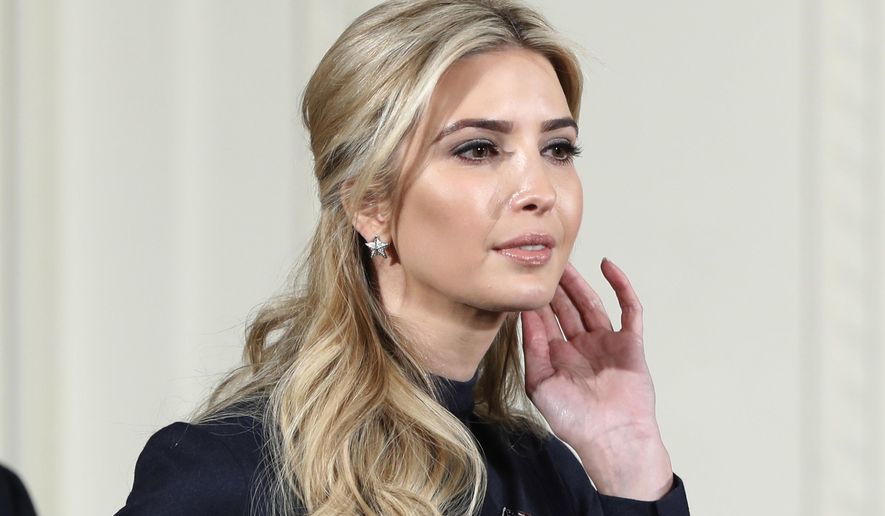WASHINGTON (AP) - President Donald Trump’s daughter Ivanka Trump will have a security clearance, a West Wing office and the ear of her father on important policy matters. But don’t call her an employee.
When it comes to government work, “employee” is more than just a word. That designation triggers an array of transparency and ethical provisions, including a law prohibiting conflicts of interest.
Government watchdogs are concerned that by refusing to call Ivanka Trump an employee, White House counsel Don McGahn could be attempting to give her a loophole if she improperly mingles her government policy roles with her business and financial interests.
In a letter Friday to McGahn, they ask him to reconsider, saying the position as designed “creates a middle space that does not exist.” It is signed by two former White House lawyers and three other transparency and ethics advocates, all of whom have been highly critical of the Trump administration’s approach to ethics.
“On the one hand, her position will provide her with the privileges and opportunities for service that attach to being a White House employee,” they write. “On the other hand, she remains the owner of a private business who is free from the ethics and conflicts rules that apply to all White House employees.”
The White House rejects that notion.
As an adult first daughter with an interest in politics and a clothing and lifestyle brand of her own, Ivanka Trump is in an unprecedented situation. There’s no protocol for this, said a senior White House official who requested anonymity to discuss a personnel matter. She’s family, not an employee.
Another person close to Ivanka Trump earlier told The Associated Press that Ivanka believes she can offer more independent perspective to her father by not serving as a White House staffer.
Richard Painter, one of the letter’s signatories and President George W. Bush’s chief ethics counselor, said he cannot recall a White House that had such high-powered “non-employees.”
One of the most politically active close relatives of a sitting president was Hillary Clinton. And she successfully fought to be considered a federal employee because of the privacy benefits it involves.
A June 1993 ruling by a federal appeals court enabled Clinton to keep secret the details of the health care reform panel that she led.
Ivanka Trump is choosing to be in a less formal role than her husband, Jared Kushner, who is a senior adviser to the president and, as an employee, must follow the rules.
She has relinquished control of her brand but, like her father, continues to own and financially benefit from her businesses. She will “voluntarily comply with the rules that would apply if she were a government employee, even though she is not,” her attorney Jamie Gorelick said this week.
Gorelick, who also helped Kushner through the White House appointment process, said McGahn’s office agreed with the decision. Ivanka Trump and Kushner have said they will not accept government pay.
Fred Wertheimer, one of the authors of the letter to McGahn and president of the Washington watchdog Democracy 21, said Ivanka Trump “should not be treated differently than any other government employee just because she is the president’s daughter.”
“This is untenable. She can make a decision at any time not to comply and there’s no penalty or sanction whatsoever,” he said. “We don’t normally have White House employees voluntarily complying with rules that were enacted to protect the American people.”
The senior White House official left open the possibility of altering the Ivanka Trump arrangement at some point - again stressing that this is new territory.
Others in Trump’s White House have drawn outside scrutiny for government work without the usual set of rules that accompanies it.
Billionaire Carl Icahn, a special adviser to the president on regulatory reform and one of his close friends, merited a 700-word press release when he agreed to join the administration. The announcement concluded that “he will not be serving as a federal employee or a special government employee and will not have any specific duties.”
Icahn has a sprawling business portfolio that is directly affected by government regulations, and at the same time Trump has tasked him to help fulfill his campaign promise of reducing regulations. Since Icahn isn’t technically a White House employee, he’s had to do nothing to clear out potential conflicts of interest.
Bloomberg News reported earlier this month that Icahn is already making his mark on policy. He’s lobbying the Trump administration to change a government rule that forces refineries - including his own - to buy renewable fuel credits.
Icahn’s energy interests and his advocacy for Scott Pruitt as head of the Environmental Protection Agency prompted seven Democratic senators to write in February to McGahn demanding a fuller explanation of what exactly his White House role is.
“Publicly reported facts suggest a conflict of interest between Mr. Icahn and advice he gave President Trump on the nomination of Mr. Pruitt,” the senators wrote. Having received no answer, they followed up with a second letter to McGahn this month.
Wertheimer calls the Icahn situation “possibly the worst conflict of interest I’ve ever seen.”
White House spokeswoman Stephanie Grisham said Icahn is in no way a government employee or official.
“He is simply a private citizen whose opinion the president respects and whom the president speaks with from time to time,” she said.
__
Associated Press writer Catherine Lucey contributed to this report.




Please read our comment policy before commenting.